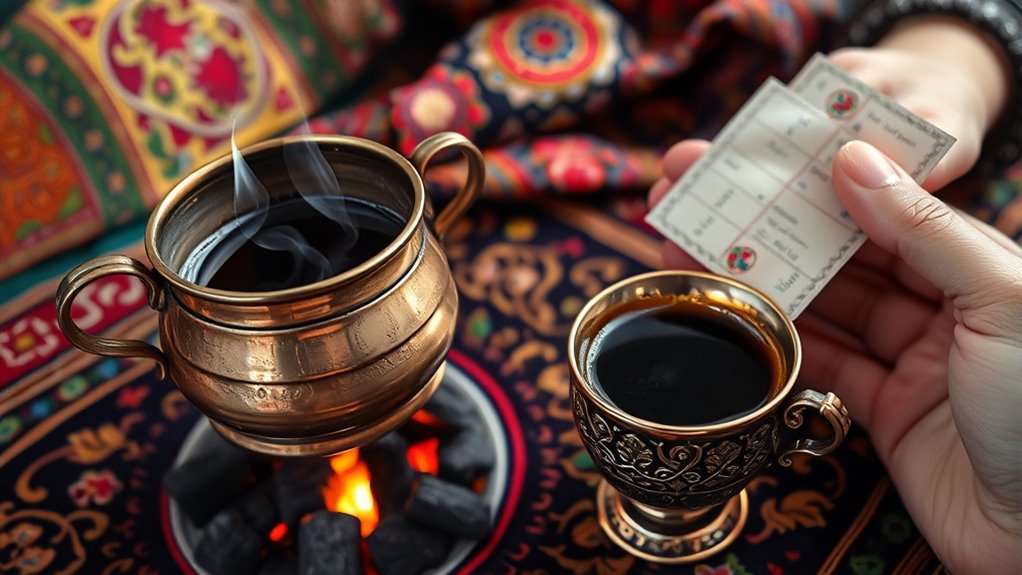Turkish coffee traditions are rich and meaningful, reflecting hospitality, social bonds, and cultural pride. When you prepare it, you’ll carefully heat finely ground coffee over low heat, embracing patience and skill. Serving it offers more than a drink—it’s a gesture of welcoming and respect. Many also use it for fortune-telling, adding an extra layer of mystery to the ritual. If you want to uncover more about these timeless customs, keep exploring this fascinating tradition.
Key Takeaways
- Brewing Turkish coffee involves slow heating in a cezve to create foam and settle grounds, emphasizing patience and tradition.
- Serving coffee is a sign of hospitality, symbolizing respect, generosity, and social bonding during gatherings.
- Turkish coffee grounds are used for fortune-telling, where patterns in the cup are analyzed to predict the future.
- Traditional coffeehouses serve as social spaces for conversation, storytelling, and cultural exchange over freshly brewed coffee.
- The ritual of preparing and serving Turkish coffee reflects cultural values of community, continuity, and the importance of shared moments.

Have you ever wondered why Turkish coffee holds such a special place in social and cultural life? It’s more than just a way to caffeinate; it’s a ritual that binds people together through tradition, storytelling, and shared moments. At the heart of this tradition is the art of coffee preparation. You begin with finely ground coffee, usually unfiltered, and combine it with cold water in a special pot called a cezve or ibrik. The mixture is slowly heated over low flame, allowing the coffee to foam up just right without boiling over. This careful process isn’t rushed; it’s a deliberate act that emphasizes patience and precision. As the coffee heats, the aroma wafts through the air, signaling the start of something meaningful. Once ready, the coffee is poured into small cups, often without stirring, so the grounds settle at the bottom. This method of preparation isn’t just about making a drink—it’s a cultural act that reflects respect for tradition and communal bonding. The cultural significance of Turkish coffee goes beyond its preparation; it embodies hospitality, respect, and social connection. Serving coffee to guests isn’t merely offering a beverage; it’s an invitation to share stories, laughter, and moments of intimacy. The serving itself is an art, with cups often decorated and placed on small trays, symbolizing generosity and warmth. In many households, offering coffee is a sign of respect and friendship, and refusing it can be seen as impolite. The process encourages a slower pace of life, urging people to sit, converse, and enjoy each other’s company. Traditional coffeehouses, or “kahvehanes,” became centers for social interaction, where patrons debated politics, shared news, and told tales, all over cups of freshly brewed Turkish coffee. It’s this deep-rooted cultural significance that elevates the coffee beyond a simple drink—it becomes a symbol of community, tradition, and identity. Whether it’s a casual visit or a special occasion, the act of preparing and serving Turkish coffee creates a shared experience that transcends generations. Every sip offers a taste of history and a reminder of the importance of connection. Additionally, the ceremonial aspect of Turkish coffee preparation highlights the importance of patience and skill passed down through generations, emphasizing the cultural value placed on tradition. Understanding the cultural context enhances appreciation for the deep-rooted customs involved in this ritual. When you participate in this tradition, you’re not just drinking coffee; you’re engaging in a centuries-old ritual that celebrates hospitality, storytelling, and the enduring spirit of Turkish culture.
Frequently Asked Questions
How Did Turkish Coffee Originate Historically?
You might wonder how Turkish coffee originated historically. It all started with the coffee trade, which spread coffee from Ethiopia to the Ottoman Empire. The Ottomans embraced and refined brewing methods, making it a cultural staple. Their influence helped popularize Turkish coffee across the Middle East and Europe, solidifying its role in social rituals. Today, this rich history reflects a blend of trade routes and Ottoman traditions shaping the beloved coffee.
Are There Regional Differences in Turkish Coffee Preparation?
You’ll find that regional brewing styles in Turkish coffee vary across Turkey, giving each area its own unique touch. Local flavor variations influence how you prepare and serve the coffee, with differences in grind size, sweetness levels, and serving methods. These regional differences add richness to your coffee experience, making each cup a reflection of local traditions and tastes, and showing how diverse Turkish coffee truly is.
What Are the Traditional Utensils Used in Turkish Coffee?
Imagine you’re a master craftsman, shaping a vessel for a delicate brew. You’ll use a traditional coffee cup, often small and tulip-shaped, to hold your rich Turkish coffee. The cezve design is essential, with a long handle and a narrow neck that helps create the perfect foam. These utensils are more than tools—they’re part of the ritual that transforms simple coffee into a cherished experience.
How Do Social Customs Influence Turkish Coffee Serving?
Social customs greatly influence how you serve Turkish coffee through specific coffee etiquette and serving rituals. You’re expected to serve coffee with respect and politeness, often offering it to guests before yourself. The way you present the coffee, including the serving tray and accompanying cups, reflects hospitality and warmth. Following these traditions shows your appreciation for cultural values and creates a welcoming atmosphere for everyone involved.
What Are Modern Variations of Turkish Coffee Recipes?
You explore modern variations of Turkish coffee recipes by experimenting with different coffee flavorings, adjusting sweetness levels, and trying alternative brewing methods like using a French press or espresso machine. You might add cardamom, cinnamon, or vanilla for unique tastes. These updates keep the traditional spirit alive while embracing contemporary preferences, making your coffee experience more personalized and innovative. So, you get to enjoy Turkish coffee in fresh, exciting ways.
Conclusion
As you explore Turkish coffee traditions, you’ll discover how this rich culture blends brewing, fortune-telling, and hospitality into a enthralling experience. Did you know that over 70% of Turks enjoy coffee daily, making it a essential part of social life? Savor each cup, embrace the cultural rituals, and appreciate the warmth and connection it brings. Turkish coffee isn’t just a drink—it’s a cherished tradition that unites people and tells stories in every sip.









